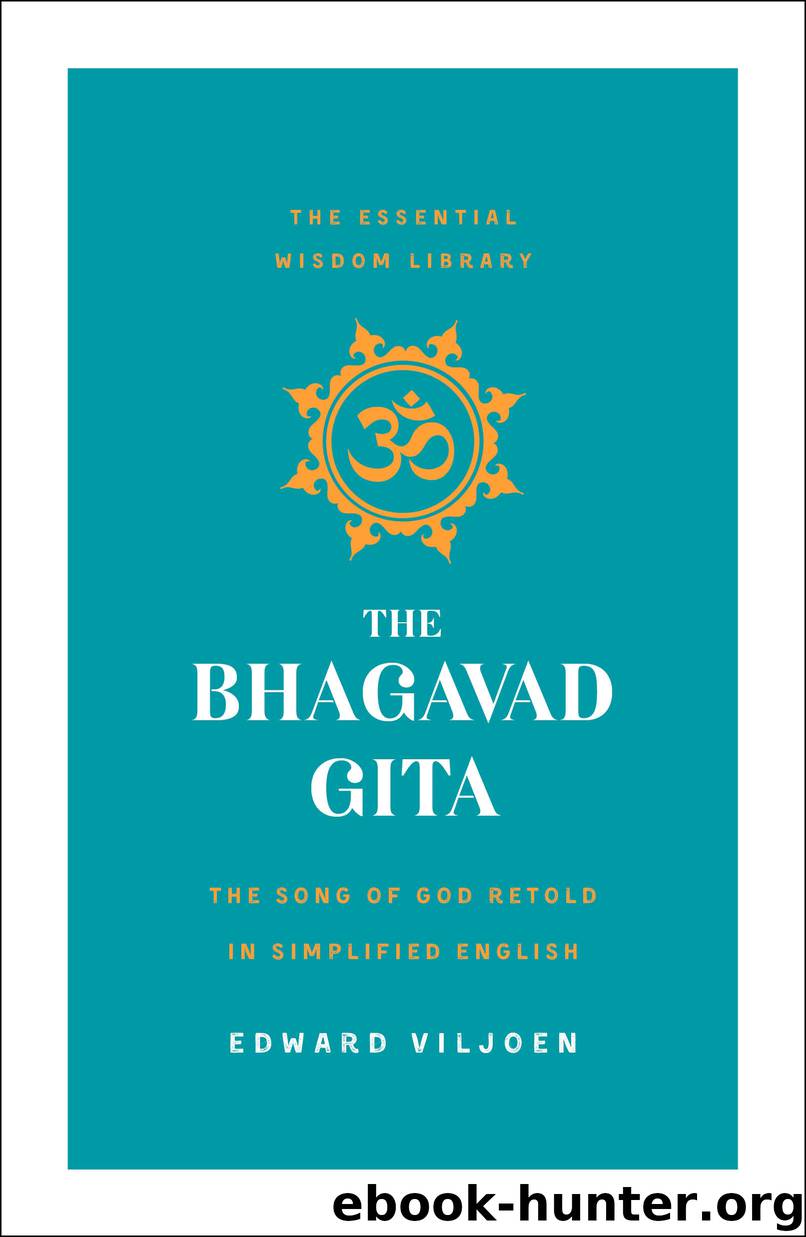The Bhagavad Gita by Edward Viljoen

Author:Edward Viljoen
Language: eng
Format: epub
Publisher: St. Martin's Press
A Book of War for Times of Peace
Killing these
Must breed but anguish, Krishna! If they be
Guilty, we shall grow guilty by their deaths;
Their sins will light on us, if we shall slay
Those sons of Dhritirashtra, and our kin;
What peace could come of that, O Madhava?1
For if indeed, blinded by lust and wrath,
These cannot see, or will not see, the sin
Of kingly lines o’erthrown and kinsmen slain,
How should not we, who see, shun such a crime—
We who perceive the guilt and feel the shame.
—Bhagavad Gita 1:382
Mohandas Gandhi called the Bhagavad Gita a book of priceless worth.3 He referred to it for guidance and recited certain verses from it as daily prayers. He first encountered the Bhagavad Gita in 1889 when he was twenty years old while studying law in England. Fellow students introduced him to Sir Edwin Arnold’s English version of the Bhagavad Gita, The Song Celestial. The Bhagavad Gita quickly found its way into Gandhi’s heart and became part of the inspiration for his teaching of nonviolence, even though the Bhagavad Gita seems to advocate fighting. Gandhi took the Bhagavad Gita as a metaphor, without denying that a historical battle may have taken place. Gandhi asserted that although the Bhagavad Gita is set at the beginning of a war, and that the opening chapters clearly speak in favor of war, its teachings when practiced lead unquestionably to nonviolence, peace, introspection, honor, devotion, and selfless service. Gandhi read the Bhagavad Gita in the context of its time when war was a standard method of resolving disagreements. He thought that the idea of war might seem brutal to some today, just as the habit of drinking milk today might seem cruel and barbaric to some in future generations. The question of how to conduct oneself in each age, he believed, must be answered within the norms of that age.
Even though Lord Krishna urges Prince Arjuna to do his duty as a warrior in a time of war, the Bhagavad Gita moves swiftly away from the subject of warfare and offers neither military strategy nor combat advice. Instead, it delves into spiritual ethics, the practice of devotion, and knowledge of the Divine. It is indeed, as Gandhi suggests, difficult to imagine how studying the Bhagavad Gita could lead to violence. How, then, do we reconcile its message of union with the Divine and its placement on the eve of a fierce battle? Eknath Easwaran argues that the Bhagavad Gita is not properly part of the Mahabharata. Instead, he asserts that it was likely inserted into the epic poem, and that its message does not develop the story of war but is somewhat at odds with it.4 Notably, the outcome of the battle is not happiness but loss and regret. So, if the Bhagavad Gita is to be taken as in favor of war, it is important to consider the heartbreaking outcome: the destruction of almost everyone. In that regard, its message may be thought of as a warning about the tragedy of war.
The
Download
This site does not store any files on its server. We only index and link to content provided by other sites. Please contact the content providers to delete copyright contents if any and email us, we'll remove relevant links or contents immediately.
| Bhagavad Gita | Upanishads |
| Vedas |
Fingersmith by Sarah Waters(2532)
Kundalini by Gopi Krishna(2180)
Wheels of Life by Anodea Judith(2144)
Indian Mythology by Devdutt Pattanaik(1936)
The Bhagavad Gita by Bibek Debroy(1929)
The Yoga of Jesus: Understanding the Hidden Teachings of the Gospels by Paramahansa Yogananda(1860)
Autobiography of a Yogi (Complete Edition) by Yogananda Paramahansa(1824)
The Man from the Egg by Sudha Murty(1812)
The Book of Secrets: 112 Meditations to Discover the Mystery Within by Osho(1673)
Chakra Mantra Magick by Kadmon Baal(1638)
The Sparsholt Affair by Alan Hollinghurst(1585)
Sparks of Divinity by B. K. S. Iyengar(1532)
Gandhi by Ramachandra Guha(1528)
Avatar of Night by Tal Brooke(1520)
Karma-Yoga and Bhakti-Yoga by Swami Vivekananda(1491)
The Bhagavad Gita (Classics of Indian Spirituality) by Eknath Easwaran(1487)
The Spiritual Teaching of Ramana Maharshi by Ramana Maharshi(1432)
Hindoo Holiday by J. R. Ackerley(1377)
Hinduism: A Very Short Introduction (Very Short Introductions) by Knott Kim(1374)
